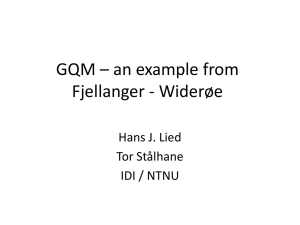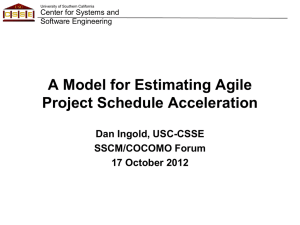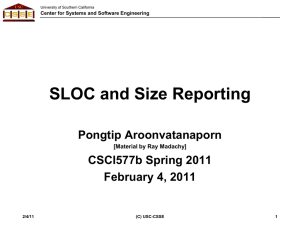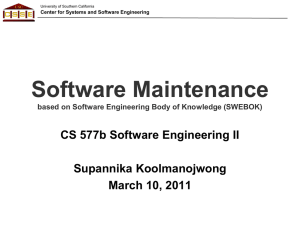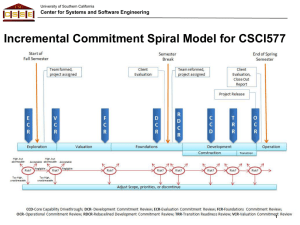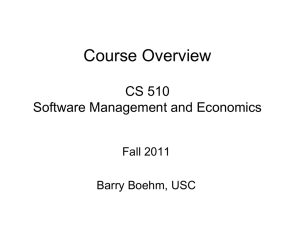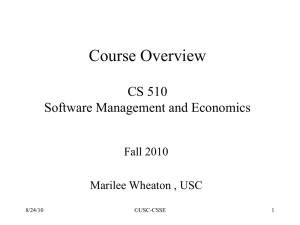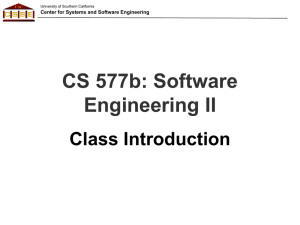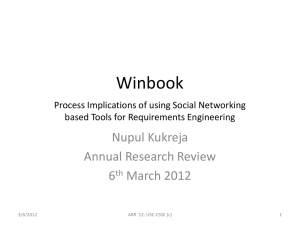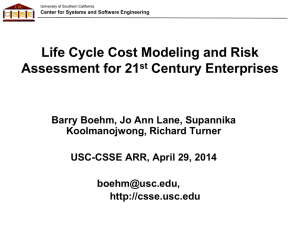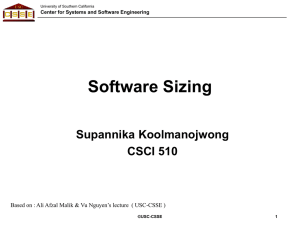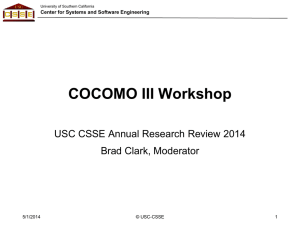GQM - Software Engineering II - University of Southern California
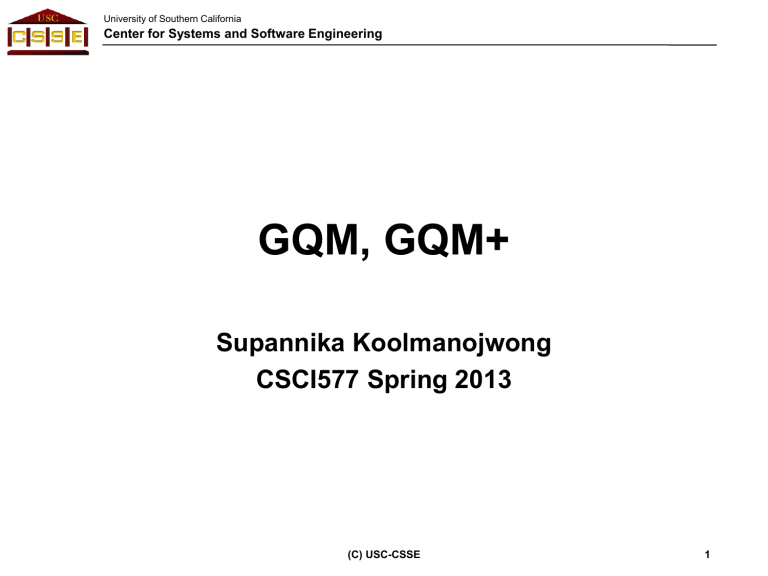
University of Southern California
Center for Systems and Software Engineering
GQM, GQM+
Supannika Koolmanojwong
CSCI577 Spring 2013
(C) USC-CSSE 1
University of Southern California
Center for Systems and Software Engineering
Project Tracking
• Goal-Question-Metric
• Goal-Question-Metric +
(C) USC-CSSE 2
University of Southern California
Center for Systems and Software Engineering
GQM paradigm
http://thecriticalpath.info/tag/gqm/
(C) USC-CSSE 3
University of Southern California
Center for Systems and Software Engineering
Goal-Question-Metric: What?
• Promoted By Victor Basili, University of Maryland
Software metric approach
• Captures measurement on three levels
– Conceptual level (goal)
• Defined for an object
– Operational level (question)
• Define models of the object of study
– Quantitative level (metric)
• Metrics associated with each question in a measurable way
(C) USC-CSSE 4
University of Southern California
Center for Systems and Software Engineering
Goal-Question-Metric: Why?
• Used within context of software quality improvement
• Effective for the following purposes:
– Understanding organization’s software practices
– Guiding and monitoring software processes
– Assessing new software engineering technologies
– Evaluating improvement activities
(C) USC-CSSE 5
University of Southern California
Center for Systems and Software Engineering
Goal-Question-Metric: How?
• Six-step process
1.
Develop a set of corporate, division, and project business goals
2.
Generate questions defining those goals
3.
Specify measures needed to be collected to answer questions
4.
Develop mechanisms for data collection
5.
Collect, validate, and analyze data. Provide feedback in realtime
6.
Analyze data in post mortem fashion. Provide recommendations for future improvements.
(C) USC-CSSE 6
University of Southern California
Center for Systems and Software Engineering
To create Goal
• Build a sentence addressing each topic
– “…object, purpose, quality attribute, perspective/viewpoint, environment …”
“ Analyze the unit test process to understand the impact of adding additional tests to project A from the viewpoint of the project manager .”
Object – unit test process
Purpose – understand
Focus – impact of adding additional tests
View point - project manager
Environment – Project A
(C) USC-CSSE http://sqgne.org/presentations/2007-08/Dow-Nov-2007.pdf
7
University of Southern California
Center for Systems and Software Engineering http://sqgne.org/presentations/2007-08/Dow-Nov-2007.pdf
(C) USC-CSSE 8
University of Southern California
Center for Systems and Software Engineering http://sqgne.org/presentations/2007-08/Dow-Nov-2007.pdf
(C) USC-CSSE 9
University of Southern California
Center for Systems and Software Engineering
GQM example
Goal 1
Question 1
Metrics 1
Metrics 2
Metrics 3
Metrics 4
Metrics 5
Question 2
Metrics 6
Metrics 7
Metrics 8
Metrics 9 http://thecriticalpath.info/tag/gqm/
[1] Purpose
[2] Issue
[3] Object (process)
[4] Viewpoint
Maintain a maximum level of customer satisfaction from the Help Desk user’s viewpoint
What is the current help desk ticket trend?
Number of help desk tickets closed
Number of new help desk tickets
% tickets outside of the upper limit
Subjective rating of customer satisfaction
Number of new help desk tickets open
Is the help desk satisfaction improving or diminishing?
Number of help desk calls abandoned
Number of help desk calls answered
Number of help desk calls sent to voicemail
Subjective rating of customer satisfaction
(C) USC-CSSE 10
University of Southern California
Center for Systems and Software Engineering
GQM Example
http://www.goldpractices.com/practices/gqm/
(C) USC-CSSE 11
University of Southern California
Center for Systems and Software Engineering
GQM Example
AT&T developers was evaluating effectiveness of software inspections.
• The main task was cost-benefits analysis of the inspections. (amount of effort expended per thousands of lines of code reviewed)
Goal
Plan
Monitor and control
Question
How much does the inspection process cost?
How much calendar time does the inspection process take
Metrics
Average effort per KLOC
Percentage of the reinspections
Average effort per KLOC
Total KLOC inspected
What is the quality of the inspected
Average faulted detected per KLOC
Average inspection rate software
Average preparation rate
To what degree did the staff conform to the procedures
Average inspection rate
Average preparation rate
Average lines of code inspected
What is the status of the inspection process?
Total KLOC inspected
(C) USC-CSSE 12
University of Southern California
Center for Systems and Software Engineering
Improve
How effective is the inspection process?
What is the productivity of the inspection process?
Defect removal efficiency
Average faults detected per KLOC
Average inspection rate
Average preparation rate
Average lines of code inspected
Average effort per fault detected
Average inspection rate
Average preparation rate
Average lines of code inspected
(C) USC-CSSE 13
University of Southern California
Center for Systems and Software Engineering
GQM Example
• TASK: Software-development process management
PROBLEM: During the software testing phase many anomalies were discovered and it is suspected that the software quality would not reach a satisfactory level by the shipping deadline.
QUESTION: Construct a GQM tree that helps you to decide when it would be possible to ship the software.
(C) USC-CSSE 14
University of Southern California
Center for Systems and Software Engineering
When it would be possible to ship the software?
(C) USC-CSSE 15
University of Southern California
Center for Systems and Software Engineering
(C) USC-CSSE 16
University of Southern California
Center for Systems and Software Engineering
GQM – example : Office Space
http://www.cura.org.uk/fig88gqmetric.pdf
(C) USC-CSSE 17
University of Southern California
Center for Systems and Software Engineering
GQM+Strategies: What?
• An extension of GQM
– Built on top
• Link software measurement goals to higher-level goals
– Software organization
– Entire business
(C) USC-CSSE 18
University of Southern California
Center for Systems and Software Engineering
GQM+Strategies: Example
• Wants: Increase customer satisfaction
• Strategy: Improve product reliability
– Both hardware and software
• Software development contribution
– Reduce defect slippage
– Improve testing process
– Team leaders decide on set of actions to take
– Implement improvements
– Measure results of improvements
• A tie between test defect data and customer satisfaction
(C) USC-CSSE 19
University of Southern California
Center for Systems and Software Engineering
GQM+Strategies: Example
(C) USC-CSSE 20
University of Southern California
Center for Systems and Software Engineering
Workshop
• Find a pair, do not pair with your own team members
• 25 minutes to develop questions and metrics from the given goals.
• Prepare to present your result.
(C) USC-CSSE 21
University of Southern California
Center for Systems and Software Engineering
References
•
• Goal-Question-Metric
– http://en.wikipedia.org/wiki/GQM
– http://www.cs.umd.edu/~mvz/handouts/gqm.pdf
– http://goldpractice.thedacs.com/practices/gqm/
• GQM+Strategies
– http://www.cs.umd.edu/~basili/publications/proceedings/P122.pdf
– http://www-ivs.cs.uni-magdeburg.de/sw-eng/us/java/GQM/link3.shtml
(C) USC-CSSE 22
